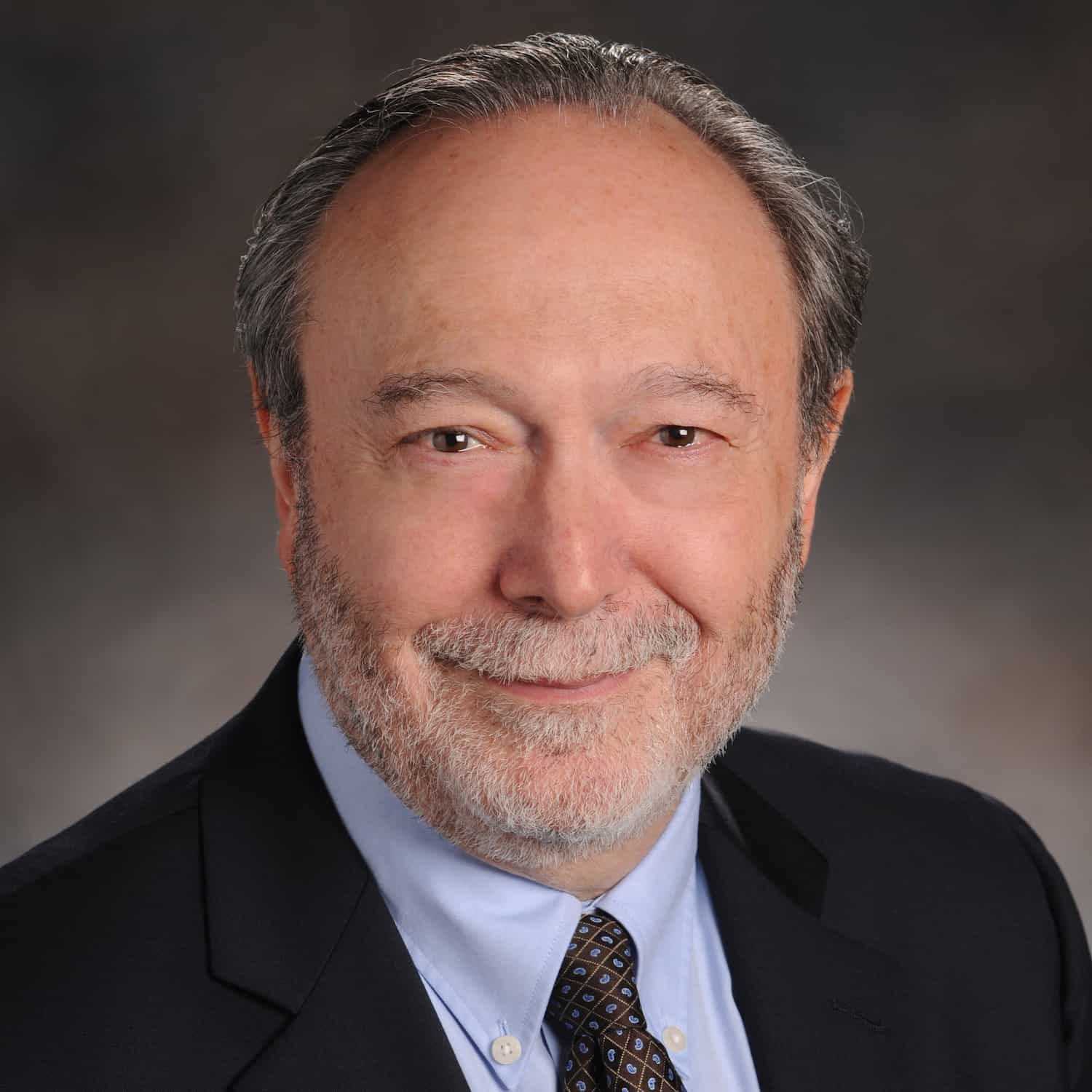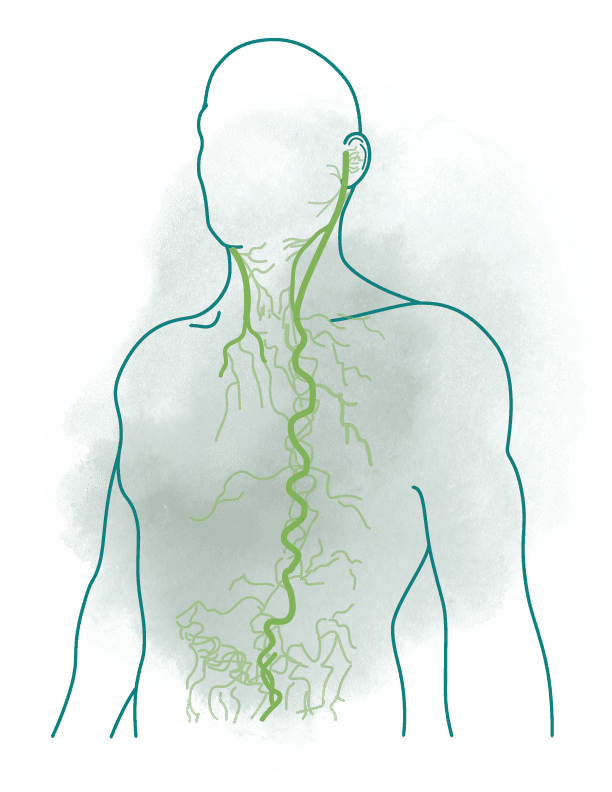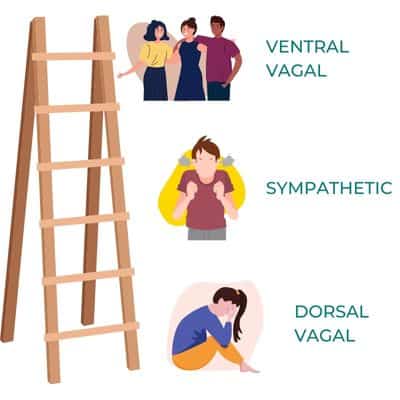Sound, Safety, Connection: The Science Behind Unyte Programs
The ability of the brain to change in response to stimulation is known as “neuroplasticity.” Our listening therapies are based on this principle, providing gentle and specific vagus nerve stimulation in order to activate the neural pathways used in the processing of sensory information.
Neural connections in these pathways are strengthened and new connections are established through repeated sessions of multisensory input, allowing the nervous system to adapt and find safety and/or homeostasis more quickly and easily, enabling clients to connect with themselves, others and the world around them.

“Our nervous system is always trying to figure out a way for us to survive, to be safe.”
— Dr. Stephen Porges
Through nervous system regulation, we can…

FEEL BETTER
Respond effectively to
life’s challenges
“Respond vs. react,” replacing emotionally charged reactivity with controlled responsiveness and resilience.

THINK BETTER
Access higher
learning and cognition
Learn and retain important facts and concepts that enable greater confidence and societal contribution.

CONNECT BETTER
Build positive
social relationships
Develop relationships and truly
connect with others.
Polyvagal Theory
Developed by world-renowned researcher and Unyte Health’s Chief Scientific Advisor, Dr. Stephen Porges, Polyvagal Theory focuses on what is happening in the body and the nervous system, and explains how our sense of safety, danger or life threat can impact our behavior.
Polyvagal Theory gives us a scientific framework that supports the integration of physiological (“bottom-up”) therapies with cognitive (“top-down”) approaches to help change and improve how we feel, think and connect with others.
Polyvagal Theory is transdisciplinary and can be combined with many modalities to better inform your clinical practice or trauma-related work.
The Vagus Nerve
The mind and body are connected through the vagus nerve, the longest nerve in the autonomic nervous system, stretching from the brainstem to the colon. It is our internal control center, allowing the brain to monitor and receive information about many of our bodily functions.
The vagus nerve helps to regulate critical aspects of human physiology, including the heart rate, blood pressure, temperature, digestion and even speaking. As the body takes in information automatically through neuroception, the vagus nerve communicates this information to the brain, which processes the signals and cues from the world around us and in turn determines how we react through three physiological states: Parasympathetic/ventral vagal state, sympathetic state, or dorsal vagal state.

The Autonomic Ladder:
Three Hierarchical Physiological States
Three Hierarchical Physiological States
The autonomic ladder, as envisioned by Deb Dana (2018), is one way to visually represent these physiological states.
- Parasympathetic/ventral vagal state: Our centered, “true self” state, where all social interaction, connection and creativity occurs.
- Sympathetic state: Feeling of threat or danger, and feeling the need to either “fight” or “flee” from a situation to seek safety.
- Dorsal vagal state: Our “freeze” state, when we feel our lives are so immediately threatened that we become immobilized.

Nervous System Regulation for Everyone
At Unyte Health, our mission is to empower every person to guide their nervous system to be more aware, regulated and resilient so they can feel safe, happy and healthy and more effectively respond to life’s challenges.
We partner with healthcare and therapeutic professionals to deliver these multisensory products in person or remotely to both children and adults. Our programs include music, movement and breathing that nourish the nervous system to enable meaningful and lasting changes in physiological state and quality of life.


Dr. Stephen Porges
Dr. Stephen Porges is the Chief Scientific Advisor at Unyte Health, driving the development of new products, therapies, research and educational programs based on Polyvagal Theory. He is the creator of the music-based intervention, the Safe and Sound Protocol (SSP) — a practical application of the Polyvagal Theory — and co-founder of the Polyvagal Institute (PVI), a not-for-profit organization focused on the facilitation of Polyvagal research, education and community-building.

Dr. Ron Minson
One of the founders of Integrated Listening Systems, Dr. Ron Minson received his medical degree from the UCLA School of Medicine and is board-certified in Psychiatry and Neurology, and served as Chief of Psychiatry. He learned of the effectiveness of sound therapy after witnessing the successful treatment of his own daughter.

Expand your knowledge of Polyvagal Theory with SSP Training
This training program delivers foundational knowledge of Polyvagal Theory and the science behind the SSP, expanded practical training on SSP delivery, and actionable steps to integrate the SSP into your practice.
Get Started with Unyte Programs
Get in touch with us to discover how the SSP and Integrated Listening System can help your clients.





 © 2025 Unyte Health US Inc.
© 2025 Unyte Health US Inc.